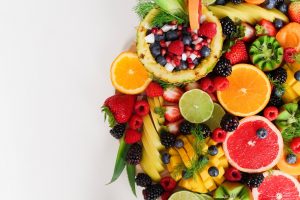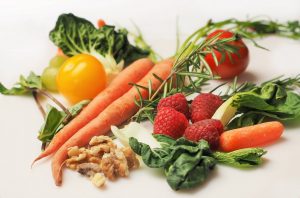 As people become more interested in healthier lifestyles many are turning to options like becoming vegetarian or vegan. There’s certainly a lot to recommend these lifestyle alternatives. The strict vegetarian doesn’t eat meat of any type but still eats animal products like dairy, eggs, honey etc. They may also still wear leather or use other products derived from animals. There are also different levels of vegetarianism – some may eat white meat still but not red meat, or eggs but not dairy, or dairy but not eggs etc. However, the bulk of their diet is still predominantly fruit, vegetables, nuts and seeds. Becoming a vegetarian in other words is more about adopting some healthier eating habits rather than a complete lifestyle change. How about veganism?
As people become more interested in healthier lifestyles many are turning to options like becoming vegetarian or vegan. There’s certainly a lot to recommend these lifestyle alternatives. The strict vegetarian doesn’t eat meat of any type but still eats animal products like dairy, eggs, honey etc. They may also still wear leather or use other products derived from animals. There are also different levels of vegetarianism – some may eat white meat still but not red meat, or eggs but not dairy, or dairy but not eggs etc. However, the bulk of their diet is still predominantly fruit, vegetables, nuts and seeds. Becoming a vegetarian in other words is more about adopting some healthier eating habits rather than a complete lifestyle change. How about veganism?
Becoming vegan on the other hand is much more of a complete lifestyle change. The vegan doesn’t eat any or use any animal products. They use plant-based alternatives to dairy and things like honey. They don’t use any products that originated with, or are derived from, animals / birds / sea creatures. This includes leather, wool and silk as well as products containing animal fats, animal hairs, feathers or similar.
When it comes to nutrition a vegetarian is usually able to find food products that incorporate most, if not all, essential vitamins, minerals, proteins, fats and carbohydrates. Dairy and eggs for example are important in a vegetarian diet as they provide essential nutrients like calcium, vitamin B12, heme iron etc. Although there are plant-based alternatives to these nutrients (broccoli for example is high in calcium), it’s important to understand that, as omnivores, humans are designed to metabolise some animal-based nutrients more readily than plant-based ones. Iron is a good example of this. Iron from animal sources is heme, which we can readily absorb. Plants contain non-heme iron, which we can’t as readily absorb. We can still metabolise non-heme iron but we generally need to eat more of it to get the same nutritional benefits.
Getting enough essential nutrients is more difficult for a vegan. It is certainly possible but it does take careful dietary planning.
So what does a vegan diet and hair loss have in common?
Telogen effluvium, or the excessive loss of hair during the telogen stage of the hair cycle, is usually brought on by a sudden shock to the body as we explain in this article. This includes the sudden nutrient deficiencies that may occur when someone suddenly switches to a vegan diet without adequately compensating for nutrients they will no longer be getting from animal sources.
Hair Needs Protein
Hair is made from a protein called keratin. Healthy hair, and indeed a healthy body, requires a regular supply of proteins from dietary sources. The body breaks down proteins into their constituent amino acids during digestion. These amino acids are then used as part of every important process that goes on in our body. Building new tissues, repairing damaged tissues, growth, maintaining our major organs and various body systems – these all require adequate amounts of a wide variety of different proteins. Lack of protein contributes to hair loss because the body will ensure vital organs get first dibs on what available protein there is. Hair is not considered a vital organ so it’s one of the first things to lose its protein supply when protein is in short supply.
The good news is that non-animal protein sources are abundant in a vegan diet. There are plenty of quality plant-based proteins that are excellent alternatives. Chickpeas, beans, nuts (particularly almonds), lentils, soy and soy products, seitan, tofu, hemp seeds, sunflower seeds and quinoa are amongst the best sources of plant-based protein.
Hair Also Needs Zinc
Zinc can be an issue for vegans* [Proceedings of the Nutrition Society]. An adult female needs 8 milligrams daily and an adult male 11 milligrams. Unfortunately the best sources of zinc are animal based and include beef, chicken, pork and oysters. Insufficient dietary levels of zinc can cause dull, lacklustre hair. Zinc is also an important component in functions like cell division, hormone regulation, tissue growth, DNA, and protein synthesis. It’s a vital component needed for normal hair follicle development and strength. Without these, your hair will be thin and stand a good chance of falling out or breaking as well as looking unhealthy.
Good plant based sources of zinc include chickpeas, beans, seeds and nuts like cashews. Many cereals are also fortified with zinc. A half-cup of chickpeas contains 8.4 milligrams of zinc so will provide an adult female with her total daily requirement and when combined with half a cup of cashews (3.8 milligrams of zinc) will provide an adult male with his.
The Role Of Vitamin B12 In Healthy Hair
Vitamin B12 is a water-soluble vitamin that is involved in red blood cell production. Red blood cells supply tissues with oxygen, including hair follicles. Oxygen in turn is an integral part of cellular respiration, the process by which our cells break down glucose to produce energy. Without sufficient oxygen our cells can’t generate the energy they need to function correctly.
The living tissues in hair follicles likewise require a regular supply of oxygen in order to produce strong, healthy hair. If this oxygen supply is compromised, as is the case when a person has abnormal red blood cells caused by vitamin B12 deficiency anaemia, hair loss and premature greying may result.
The good news for new vegans is that B12 is one of the few vitamins the body can store. Providing your previous diet contained adequate amounts of it, your liver can store enough B12 to last between 2 and 4 years. We also don’t require huge amounts of it – just 6 micrograms daily. The bad news for vegans though is that there are very few non-animal sources of B12. Nutritional yeast and tempeh are two of these but you need to eat a lot of them to get your recommended daily amount. There are vitamin B12 fortified soy products, grains and cereals available and these should be included in your diet. Alternatively, you may need to take a vitamin B12 supplement.
You can also try fortified B-12 food such as soy products and breakfast cereals. In such a case, you need to eat two-three portions a day to get at least three micrograms of B12.
Iron For Iron Hair
Iron is involved in transporting oxygen around the body to your cells via your bloodstream. And as we’ve already mentioned with vitamin B12, inadequate supply of oxygen to your hair follicles directly affects your hair and its health. Women require around 18 mgs of iron daily and men require 8 mgs.
Once again, the primary sources of iron are found in animal products like red meat. Iron from animal sources is also heme iron, which we can readily absorb. There are a number of plant-based sources of iron, albeit the non-heme variety which we can’t as easily absorb, meaning we have to eat a lot more of these plants to get enough iron. Good plant sources of iron include green vegetables like broccoli, kale and spinach as well as beet, almonds and soy.
Other Vegan Options For Maintaining A Healthy Head Of Hair
Apart from the foods already mentioned, avocados are an important source of the healthy fats needed for good health, including healthy hair. We’ve already mentioned almonds – this super nut is high in both protein and vitamin E. Chia and flax seeds are rich in vitamins B and E respectively as well as a good source of iron and calcium (chia). Flax seeds are additionally high in omega-3 fatty acids. Coconut should be another product high on your list of vegan alternatives because it’s full of healthy fats. And of course we all know lentils, beans and other legumes are vitally important in a vegan diet as they are excellent sources of protein, iron, zinc and biotin.


